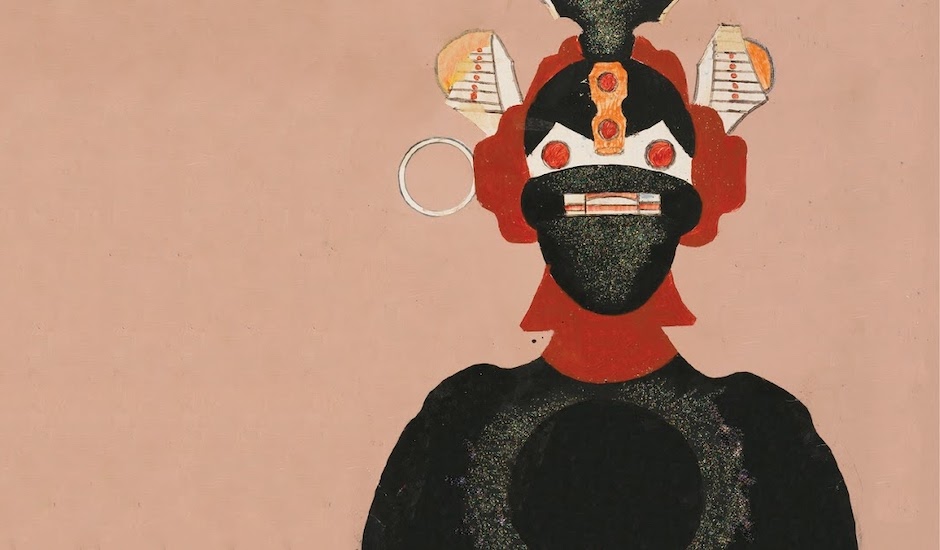 Listen to two new Julia Jacklin songs, Cry / to Perth, before the border closesThe tracks are the first since Julia Jacklin's spectacular 2019 album Crushing, and come as a part of Sub Pop's single collection.
Listen to two new Julia Jacklin songs, Cry / to Perth, before the border closesThe tracks are the first since Julia Jacklin's spectacular 2019 album Crushing, and come as a part of Sub Pop's single collection.

Ten years of The Age of Adz, Sufjan Stevens’ embrace of the unexpected
When first faced with his own celebrity, Sufjan Stevens responded with a left-field masterclass that today turns ten years old.
Sufjan Stevens has found his greatest successes in patience.
In the five years from 1999 to 2004, the Detroit singer-songwriter released four solo records, establishing himself as an idiosyncratic voice in the burgeoning folk scene. A Sun Came saw a 24-year-old Stevens step out from the ranks of college folk act Marzuki, enshrining his love of lo-fi palettes and exotic instruments, and Enjoy Your Rabbit channelled a high concept vision, mulling over the Chinese Zodiac and the existence of God himself atop tinkering electronica and clashing distortion. Michigan was something of a critical breakout, and less than a year later, Seven Swans offered a delicate insight into Sufjan’s personal faith.
His first taste of true popular crossover came on 2005’s Illinois, an oft-whimsical, sometimes haunting dedication to one of America’s most storied states. He broke onto the Billboard Charts, earned a plaque from the RIAA and landed a spot on the Little Miss Sunshine soundtrack, but behind the veneer of professional success, Sufjan was grappling with more personal trials.
It was in the midst of those trials that he laid the foundations of his sweeping 2010 record, The Age of Adz, informed by the spectre of illness, the need for creative invigoration and the story of a schizophrenic artist. A decade on from that striking release, it’s clearer than ever how Adz helped Stevens push past the conceptual and embrace the abstract, eschewing structure and storytelling in pursuit of unbridled introspection. It’s a pivot that would change his process forever, breaking him from the mould of tradition and spurring him on to further greatness.
In a way, Illinois was almost too acclaimed for Stevens. “I think it's weird at all that anyone's interested in what I'm doing,” Sufjan told Pitchfork in 2006, bemoaning the state of his own voice, the nature of his music and the weight of his own ambitions. “I don’t think Illinois is as good as people say it is,” said Stevens on tour in 2006, considering the gaze of fame. “I feel more pressure from myself, and my own goals, which are much grander than anything I can accomplish.” His theatrical live shows showed a restless mind relishing his own artistry, but within his largely guarded personal life, Sufjan seemed a man at odds with his own place in the greater equation.
“I think there is something very ‘easy listening’ about my music,” he admitted to Pitchfork. “My colleague at Asthmatic Kitty, Michael Kaufman… he’s been challenging me to sort of undermine that, how to responsibly sabotage the listenability of my music in order to challenge it. And I think right now, creatively, I need to go somewhere where I'm taking greater risks.”
In the years following Illinois, Stevens lent into the abstract, releasing a compilation of album offcuts for “a sense of resolve,” rearranging the electronic Enjoy Your Rabbit as an orchestral suite, and composing an original orchestral suite for The BQE, “a non-personal, non-narrative” multimedia piece celebrating the Brooklyn-Queens Expressway. He also managed a 42-track Christmas record in late 2006, an exhaustive project that speaks to not only Sufjan’s eccentricities but a newfound passion for side projects and art pieces. He even considered quitting music altogether. At some point amongst all this, pulled every which way by inspiration and doubt, Sufjan started to get sick – really sick.
“Stevens woke up in a sweat,” wrote The Guardian’s Tim Lewis in 2011. “He felt intensely lethargic and had pins and needles in his mouth, his hands and feet, rushing up his arms and legs. He was experiencing extreme adrenaline surges in his chest, almost as if he had been poisoned.” Sufjan himself called the condition “really supernatural," remembering it as being “like I was possessed."
Doctors agreed. A procession of professionals were left dumbfounded by Sufjan’s illness, which briefly subsided only to later return. He found himself hyperaware, prone to overstimulation, unable to climb stairs and watch films. It was in the grips of this mystery illness – one that would eventually leave him – that Sufjan started to find comfort in vibrant outsider artist Royal Robertson.

Born in 1936, Royal Robertson spent almost his entire life in Louisiana. He worked as a sign painter, marrying Adele Brent in 1955 and having 12 children. In Sufjan’s own telling, offered during a Salt Lake City show in November 2010, Royal “lived in this little house that he made with his own hands, and he covered it with signs, and he painted signs for the local community for police cars, for the ice cream trucks, and for the local clubs.” An experienced signwriter, Royal used his spare time creatively, drawing sweeping astral planes, heavenly angels and dedications to his loving wife.
“As he got older, it became clear to his wife Adell that his gift was sort of ushering him into insanity,” explained Stevens to an impressively attentive crowd. “He would have these outbreaks of madness where he would become sort of disoriented and aggressive and violent, and so eventually, she took him to the doctor and he was diagnosed with schizophrenia.” When medication left Royal feeling “sluggish and sick,” he opted not to take it, falling further into his paranoia. “He basically receded into this insane fantasy state of mind,” explained Sufjan, that untreated condition spurring conspiratorial suspicions, extraterrestrial theories and – perhaps worst of all – fierce misogyny and accusations of infidelity, which he directed at his wife. In 1974, Adele left, taking the 12 kids to Texas.
“Royal was left alone for the last few decades of his life in this house,” he continued, explaining how the artist “completely forgot about the real world and lived in this imaginary world of spaceships and space travel and utopia and the apocalypse... he covered his house in signs and created within his home all these little shrines to these mythological creatures that he’d created.” Sufjan never met Royal, as he died suddenly of a heart attack in 1997, but the subsequent recognition he received attracted the singer-songwriter to his “gruesome and fantastic” visions.
“As I was working on this material, I found in all of this stuff – as crazy and exotic and psychotic as it was – I found it a very comfortable place to live, to reside in,” he concluded, bringing his nearly ten-minute speech to a close with a segue into Adz track Get Real, Get Right. “This song is for him,” he said, “it’s my reality in check.”
That dedication does something to explain the sheer scope of the track, which fuses religious reference, sci-fi imagery and an ever-escalating arrangement of horns, synths and flutes. There’s a restlessness to the words of the “prophet,” an allusion to Royal’s self-appointed honorific, and a heft to his want to reconcile with a greater power, presented in shades of personal atonement and self-help. If that renewal is the crux of the song, it stops short of being the key: that’s in how the perspective shifts from accusatory to confessional, quietly moving from a second-person story to a first-person admission.
Such is the place of Royal in The Age of Adz – his unmitigated self-expression and tumultuous inner conflict serves as a model for Sufjan’s own introspection. In a sense, Royal’s sweeping “depictions of his visions and his imagination” helped push Sufjan away from conceptual records such as Enjoy Your Rabbit, Michigan and Illinois, finding a new lease in his own untethered fantasies. The Age Of Adz isn’t a Royal Robertson concept album as much as it’s a record imbued with his fierce internal gaze, one inspired by his peerless world-building. The locales of Adz are the contours of Sufjan’s mind, the confident peaks and nervous valleys that dot a prolific psyche.
The sole slice of familiarity comes on Futile Devices, the acoustic ballad that opens the album. It’s one of Sufjan’s tenderest love songs, but it’s played as misdirection, juxtaposed against the similarly smitten Too Much, which finds affection in atonality, glitchy beats and angsty mantras. That transition speaks to the way that Stevens’ base broke in the wake of the record, with fans of his earlier work more than a little alienated by the pivot. “In terms of craft, the new songs are kind of weak,” he admitted to Tim Lewis in 2011. “The language is lazy sometimes, they meander and there's not this resolution. But I really liked being a bit abstract and sloppy and more sensual.”
In one sense, Futile Devices represents the power of his songwriting craft, distilling emotion into a beautiful confession, but on the other, it’s an acknowledgment of its own poetic futility. It’s in the wake of that realisation that Sufjan takes the emphasis off his honed lyricism, diving into a world of dense soundscapes and sweeping compositions that impart emotion as much as they furnish performance. There’s a real potency to lyrics such as “you are the life I needed all along,” but there’s just as much in yelling “I’m not fucking around!” 16 times in a row, as Stevens does on I Want To Be Well. Inelegant? Maybe. Emotive? Certainly.
"It's way more self-obsessed and leans towards masochism and solipsism and paranoia and anxiety,” said Sufjan whilst touring Adz, tethering the deeply personal record to his abstract thoughts. “I'm a very self-conscious person, I think we all are, but I'm especially not very comfortable in my body. I always feel really weird and awkward on the street or on the stage. It has nothing to do with circumstances, it's just an ongoing psychological state, like white noise."
The album stops short of embracing outright static, but Stevens makes use of dizzying discordance on songs like Age of Adz, the eight-minute title track that hits something like an orchestra battling a hydraulic-powered synth at the edge of the apocalypse. It runs a gamut from immortality to rotting flesh; invigoration to resignation; cosmic familiarity to personal selfishness; the lyrical abstractions dense but musical cues undeniable. It’s a track that imparts feeling even as it evades understanding, and that free association defines the record, which deals in big ideas and skims the fine print. Age of Adz is a song without straightforward meaning and solid structure, and yet, it’s as solid as any Stevens has written.
Even a cut such as I Want To Be Well, with a theme clearly derived from Sufjan’s own illness, channels the inner strife of Royal Robertson’s schizophrenia, eschewing the autobiographical lens of Holland or Casimir Pulaski Day in favour of a disorienting, desperate plea. It’s a cathartic telling, a flurry of sound and sentiment that says more than any restrained folk songwriter could ever hope to. It works with or without the real-life inspiration, and if you didn’t already know of Sufjan’s condition, you’d be unlikely to feel enlightened after the six-and-a-half-minute joint – but you’d definitely feel the depth of his pain.
The songs on Adz are almost entirely removed from time and place, existing in their own right, depictions of things unseen. They’re disorienting, moving without closure or conclusion, more meditations than actual accounts. It’s an approach that Sufjan would take onto Carrie & Lowell, a deeply personal record that recalls his childhood in nonetheless hazy terms. There’s certainly more minutiae on that record – allusions to swimming lessons, his late mother and his Oregeanian childhood abound – but the lyrics often run so abstract, these tales become touchstones in a sea of heady emotions.
On Should Have Known Better, Sufjan’s memory of being left at the video store by his late mother is so untethered and vague, not even Lowell Brahms himself could attest to it. These recollections feel lived in, creating a real sense of intimacy, but they let on less than you might think – especially when taken against something such as John Wayne Gacy Jr., which sketches out the murderer’s family, describes the injury that might’ve contributed to his childhood blackouts, establishes his reputation about town and lets on his terrifying crimes… all before the first chorus. That’s not to say his recent songs are lesser than his more traditional tracks, but they’re certainly looser, led more by intuition and emotion than story and character.
A decade on, it seems unlikely that any Sufjan record could measure to the audacious left-turn of Adz. It was just last month that The Ascension arrived, Sufjan’s eighth studio album dropping a whole 21 years after his debut – and 15 years on from his fifth effort. The Ascension bears similarities to his 2010 LP, though the synths seem warmer this time around, the tinkering percussion more welcoming, the fragmented voices clipped with a soft precision. It’s a calmer sound for a catastrophic era, one that breaks through in Stevens’ meditations, often as trying as the times they distil.
The twelve-and-a-half minute closer, America, puts a fine point on the crisis, but it’s telling as to what crisis it spotlights – Sufjan’s, not America’s. In a bygone era, a Stevens track titled “America” might’ve been brimming with historical allusions, pop culture punchlines and state-based esoterica, but ten years on from Adz, Stevens is content offering raw feeling. He conjures the wounds of Christ, alludes to the Biblical flood and makes mention of Judas, but no reference looks to elaborate on that central refrain: “don’t do to me what you did to America.” The context is clear; the meaning found in the peaks and troughs of his ambitious arrangement.
The Age of Adz might seem just another feather in Sufjan’s famed angel wings, but the project ushered in a new creative era for the American artist. Adz is where Stevens truly began to map out himself, not through fragments of his life in Michigan or Illinois, but by way of his hidden hopes, dreams, fantasies and fears. If Royal Robertson’s house was dotted with shrines to his fantastic beasts, The Age of Adz is packed with monuments to those that lie within Stevens’ head, labyrinthine structures built to house his sorrow, anxiety, remorse, regret and penance.
Follow Sufjan Stevens' label, Asthmatic Kitty: FACEBOOK
 Listen to two new Julia Jacklin songs, Cry / to Perth, before the border closesThe tracks are the first since Julia Jacklin's spectacular 2019 album Crushing, and come as a part of Sub Pop's single collection.
Listen to two new Julia Jacklin songs, Cry / to Perth, before the border closesThe tracks are the first since Julia Jacklin's spectacular 2019 album Crushing, and come as a part of Sub Pop's single collection.
 Meet Dreamer Boy, who makes aching nostalgia with his new song, CrybabyThe Nashville-based musician specialises in low-strung, washed-out bursts of 60s / 70s nostalgia, and he's quickly becoming one to watch.
Meet Dreamer Boy, who makes aching nostalgia with his new song, CrybabyThe Nashville-based musician specialises in low-strung, washed-out bursts of 60s / 70s nostalgia, and he's quickly becoming one to watch.